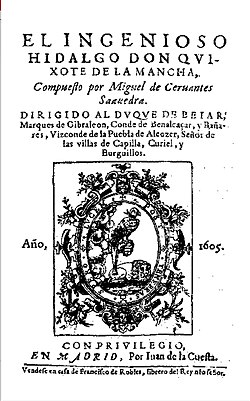
Back Don Quichot (boek) Afrikaans Don Quijote ALS ዶን ኪሖቴ Amharic Don Quixot d'a Mancha AN Don Quijote ANG डॉन क्विक्ज़ोट ANP دون كيخوتي Arabic دون كيشوت ARZ Don Quixote de la Mancha AST डन क्विजोट AWA
 Don Quixote de la Mancha (first edition, 1605) | |
| Author | Miguel de Cervantes |
|---|---|
| Original title | El ingenioso hidalgo don Quixote de la Mancha |
| Language | Early Modern Spanish |
| Genre | Novel |
| Publisher | Francisco de Robles |
Publication date | 1605 (Part One) 1615 (Part Two) |
| Publication place | Habsburg Spain |
Published in English | 1612 (Part One) 1620 (Part Two) |
| Media type | |
| 863 | |
| LC Class | PQ6323 |
Original text | El ingenioso hidalgo don Quixote de la Mancha at Spanish Wikisource |
| Translation | Don Quixote at Wikisource |
Don Quixote,[a][b] the full title being The Ingenious Gentleman Don Quixote of La Mancha,[c] is a Spanish novel by Miguel de Cervantes. It was originally published in two parts, in 1605 and 1615. Considered a founding work of Western literature, it is often said to be the first modern novel.[2][3] The novel has been labelled by many well-known authors as the "best book of all time"[d] and the "best and most central work in world literature".[5][4] Don Quixote is also one of the most-translated books in the world[6] and one of the best-selling novels of all time.
The plot revolves around the adventures of a member of the lowest nobility, an hidalgo[e] from La Mancha named Alonso Quijano, who reads so many chivalric romances that he loses his mind and decides to become a knight-errant (caballero andante) to revive chivalry and serve his nation, under the name Don Quixote de la Mancha.[b] He recruits as his squire a simple farm labourer, Sancho Panza, who brings a unique, earthy wit to Don Quixote's lofty rhetoric. In the first part of the book, Don Quixote does not see the world for what it is and prefers to imagine that he is living out a knightly story meant for the annals of all time. However, as Salvador de Madariaga pointed out in his Guía del lector del Quijote (1972 [1926]),[7] referring to "the Sanchification of Don Quixote and the Quixotization of Sancho", as "Sancho's spirit ascends from reality to illusion, Don Quixote's declines from illusion to reality".[8]
The book had a major influence on the literary community, as evidenced by direct references in Alexandre Dumas's The Three Musketeers (1844),[9] and Edmond Rostand's Cyrano de Bergerac (1897)[10] as well as the word quixotic. Mark Twain referred to the book as having "swept the world's admiration for the mediaeval chivalry-silliness out of existence".[11][f] It has been described by some as the greatest work ever written.[12][13]
- ^ Oxford English Dictionary. "Don Quixote".
- ^ Bloom, Harold (13 December 2003). "The knight in the mirror". The Guardian. Retrieved 5 July 2019.
- ^ Puchau de Lecea, Ana (25 June 2018). "Guide to the classics: Don Quixote, the world's first modern novel – and one of the best". The Conversation. Retrieved 1 July 2020.
- ^ a b "Don Quixote gets authors' votes". BBC News. 7 May 2002. Retrieved 3 January 2010.
- ^ a b Chrisafis, Angelique (21 July 2003). "Don Quixote is the world's best book say the world's top authors". The Guardian. Retrieved 13 October 2012.
- ^ Mineo, Liz (25 April 2016). "A true giant". Harvard Gazette. Boston. Retrieved 28 December 2020.
- ^ (in Spanish). Madariaga, Salvador de (1972) [1926]. Guía del lector del Quijote, Buenos Aires: Editorial Sudamericana, , 7.ª ed., caps. VII y VIII (pp. 127-135 y 137-148). Centro Virtual Cervantes. Retrieved 3 June 2023.
- ^ Pope, Randolph D. "Metamorphosis and Don Quixote". Cervantes: Bulletin of the Cervantes Society of America. Special Issue, Winter 1988, pp. 93–94. Miguel de Cervantes Virtual Library. Retrieved 3 June 2023.
- ^ Dumas, Alexandre (1893). The Three Musketeers (being the First of the D'Artagnan Romances.). United States: Collier. p. 8.
- ^ Rostand, Edmond (1926). Cyrano de Bergerac: An Heroic Comedy in Five Acts. United States: Henry Holt. p. 96.
- ^ Moore, Olin Harris (3 May 2024). "Mark Twain and Don Quixote" (PDF). PMLA. 37 (2): 324–346. doi:10.2307/457388. ISSN 0030-8129. JSTOR 457388.
- ^ "Don Quixote gets authors' votes". BBC News. 7 May 2002. Retrieved 5 July 2019.
- ^ Chrisafis, Angelique (21 July 2003). "Don Quixote is the world's best book say the world's top authors". The Guardian. London. Retrieved 13 October 2012.
Cite error: There are <ref group=lower-alpha> tags or {{efn}} templates on this page, but the references will not show without a {{reflist|group=lower-alpha}} template or {{notelist}} template (see the help page).